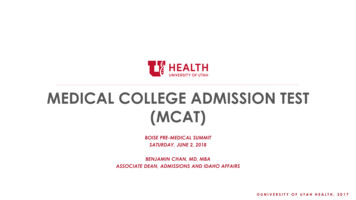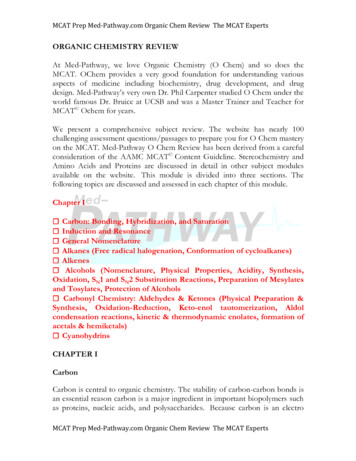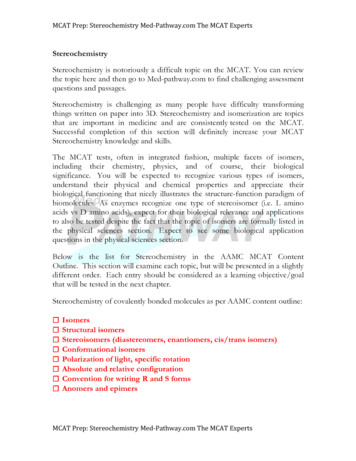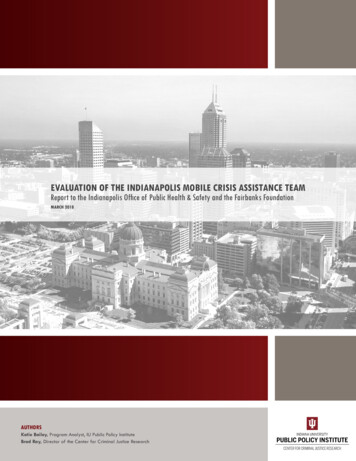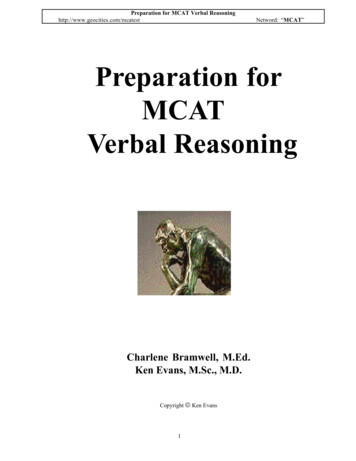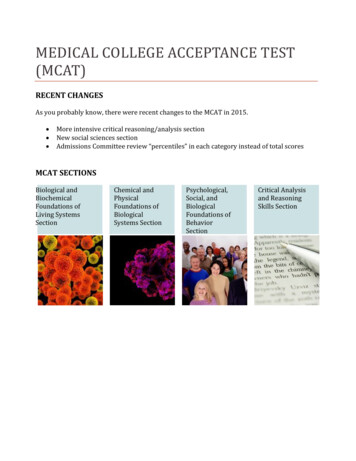
Transcription
MEDICAL COLLEGE ACCEPTANCE TEST(MCAT)RECENT CHANGESAs you probably know, there were recent changes to the MCAT in 2015. More intensive critical reasoning/analysis sectionNew social sciences sectionAdmissions Committee review “percentiles” in each category instead of total scoresMCAT SECTIONSBiological andBiochemicalFoundations ofLiving SystemsSectionChemical andPhysicalFoundations ofBiologicalSystems SectionPsychological,Social, andBiologicalFoundations ofBehaviorSectionCritical Analysisand ReasoningSkills Section
WHAT WILL THE BIOLOGICAL AND BIOCHEMICAL FOUNDATIONS OFLIVING SYSTEMS SECTION TEST?The Biological and Biochemical Foundations of Living Systems section asks you to solveproblems by combining your knowledge of biological and biochemical concepts with yourscientific inquiry and reasoning skills. This section tests processes that are unique to livingorganisms, such as growing and reproducing, maintaining a constant internal environment,acquiring materials and energy, sensing and responding to environmental changes, andadapting. It also tests how cells and organ systems within an organism act independently andin concert to accomplish these processes, and it asks you to reason about these processes atvarious levels of biological organization within a living system. This section is designed to: testintroductory-level biology, organic chemistry, and inorganic chemistry concepts; testbiochemistry concepts at the level taught in many colleges and universities in first-semesterbiochemistry courses; test cellular and molecular biology topics at the level taught in manycolleges and universities in introductory biology sequences and first- semester biochemistrycourses; test basic research methods and statistics concepts described by many baccalaureatefaculty as important to success in introductory science courses; and require you todemonstrate your scientific inquiry and reasoning, research methods, and statistics skills asapplied to the natural sciences.Number of Questions: 59 (note that questions are a combination of passage-based anddiscrete questions)Time: 95 minutesWHAT WILL THE CHEMICAL AND PHYSICAL FOUNDATIONS OF BIOLOGICALSYSTEMS SECTION TEST?The Chemical and Physical Foundations of Biological Systems section asks you to solveproblems by combining your knowledge of chemical and physical foundational concepts withyour scientific inquiry and reasoning skills. This section tests your understanding of themechanical, physical, and biochemical functions of human tissues, organs, and organ systems.It also tests your knowledge of the basic chemical and physical principles that underlie themechanisms operating in the human body and your ability to reason about and apply yourunderstanding of these basic chemical and physical principles to living systems. This section isdesigned to: test introductory-level biology, organic and inorganic chemistry, and physicsconcepts; test biochemistry concepts at the level taught in many colleges and universities infirst- semester biochemistry courses; test molecular biology topics at the level taught in manycolleges and universities in introductory biology sequences and first-semester biochemistrycourses; test basic research methods and statistics concepts described by many baccalaureatefaculty as important to success in introductory science courses; and require you todemonstrate your scientific inquiry and reasoning, research methods, and statistics skills asapplied to the natural sciences.Test Section: Chemical and Physical Foundations of Biological SystemsNumber of Questions: 59 (note that questions are a combination of passage-based anddiscrete questions)Time 95 minutes
WHAT WILL THE PSYCHOLOGICAL, SOCIAL, AND BIOLOGICALFOUNDATIONS OF BEHAVIOR SECTION TEST?The Psychological, Social, and Biological Foundations of Behavior section asks you to solveproblems by combining your knowledge of foundational concepts with your scientific inquiryand reasoning skills. This section tests your understanding of the ways psychological, social,and biological factors influence perceptions and reactions to the world; behavior and behaviorchange; what people think about themselves and others; the cultural and social differencesthat influence well-being; and the relationships between social stratification, access toresources, and well-being. The Psychological, Social, and Biological Foundations of Behaviorsection emphasizes concepts that tomorrow’s doctors need to know in order to serve anincreasingly diverse population and have a clear understanding of the impact of behavior onhealth. Further, it communicates the need for future physicians to be prepared to deal with thehuman and social issues of medicine. This section is designed to test psychology, sociology,and biology concepts that provide a solid foundation for learning in medical school about thebehavioral and sociocultural determinants of health; test concepts taught at many colleges anduniversities in first-semester psychology and sociology courses; test biology concepts thatrelate to mental processes and behavior that are taught at many colleges and universities inintroductory biology; test basic research methods and statistics concepts described by manybaccalaureate faculty as important to success in introductory science courses; and require youto demonstrate your scientific inquiry and reasoning, research methods, and statistics skills asapplied to the social and behavioral sciences. Test Section Number of Questions TimePsychological, Social, and Biological Foundations of Behavior 59 (note that questions are acombination of passage-based and discrete questions) 95 minutesWHAT WILL THE CRITICAL ANALYSIS AND REASONING SKILLS SECTIONTEST?The Critical Analysis and Reasoning Skills section of the MCAT exam will be similar to many ofthe verbal reasoning tests you have taken in your academic career. It includes passages andquestions that test your ability to understand what you read. You may find this section to beunique in several ways, though, because it has been developed specifically to measure theanalysis and reasoning skills you will need to be successful in medical school. The CriticalAnalysis and Reasoning Skills section achieves this goal by asking you to read and think aboutpassages from a wide range of disciplines in the social sciences and humanities, followed by aseries of questions that lead you through the process of comprehending, analyzing, andreasoning about the material you have read. Critical Analysis and Reasoning Skills passagesare relatively short, typically between 500 and 600 words, but they are complex, oftenthought-provoking pieces of writing with sophisticated vocabulary and, at times, intricatewriting styles. Everything you need to know to answer test questions is in the passages andthe questions themselves. No additional coursework or specific knowledge is required to dowell on the Critical Analysis and Reasoning Skills section, but you, as the test taker, may findyourself needing to read the passages and questions in ways that are different from thereading required in the textbooks you used in most pre-health courses or on tests like the SATCritical Reading exam. Passages for the Critical Analysis and Reasoning Skills section— eventhose written in a conversational or opinionated style—are often multifaceted and focus on
the relationships between ideas or theories. The questions associated with the passages willrequire you to assess the content, but you will also need to consider the authors’ intentionsand tones and the words they used to express their points of view. This section is designed totest your comprehension, analysis, and reasoning skills by asking you to critically analyzeinformation provided in passages; include content from ethics, philosophy, studies of diversecultures, population health, and a wide range of social sciences and humanities disciplines;and provide all the information you need to answer questions in the passages and questionsthemselves.Test Section: Critical Analysis and Reasoning SkillsNumber of Questions: 53 (note the questions are all passage-based)Time 90 minutesMCAT BOOKLETFor more information about specific sections and the overall MCAT, review the AMCAS production/media/filer cat2015-content.pdfSCORING MODELYou will receive five scores from your MCAT exam: one for each of the four sections and onecombined total score.Section Scores: Each of the four sections--Biological and Biochemical Foundations of LivingSystems; Chemical and Physical Foundations of Biological Systems; Psychological, Social, andBiological Foundations of Behavior; and Critical Analysis and Reasoning Skills--is scored froma low of 118 to a high of 132, with a midpoint of 125. Test takers will receive scores for each ofthe four sections.Total Score: Scores for the four sections are combined to create a total score. The total scoreranges from 472 to 528. The midpoint is 500.
MD: 87-100th Percentile(512-528)DO: 57-100th Percentile(501-511)ISRAELI: 43-100th Percentile(498-500)Any student who receives less than the suggested percentiles above, should e-mail Mrs.Wood-Hill at woodhill@yu.edu immediately upon receiving their grades to discuss theirsituation.While we review the MCAT scores for all applicants, we expect applicants with the abovementioned scores to initiate contact with us immediately upon receipt of their scores.Students who have borderline scores face the difficult decision about whether to repeat theMCAT exam. In such cases, especially in light of the new testing calendar for the MCATs, wesuggest you register to retake the test, even though you won’t get a refund if you decide notto retake it. This registration will ensure you have the opportunity to take it on a day and ata place that is convenient for you.
Be Prepared—May June 1 Thursday date (18th)1 Friday date (19th)2 Thursday dates (1st, 29th)2 Friday dates (16th, 30th)Updated: September 21, 2016
(MCAT) RECENT CHANGES . As you probably know, there were recent changes to the MCAT in 2015. More intensive critical reasoning/analysis section New social sciences section Admissions Committee review "percentiles" in each category instead of total scores . MCAT SECTIONS . Biological and Biochemical Foundations of Living Systems .



